What would you do if God spoke to you from a burning bush?
Would you abandon your comfortable life to lead an entire nation into the unknown?
Moses wasn't a perfect hero, but he was chosen by God for one of the greatest missions in history.
This biblical figure marked the spiritual, political, and legal course of the people of Israel, and his legacy continues to transform lives today.
Discover who Moses really was in the Bible, what made him so special, and why his story still resonates powerfully today.
Introduction to Moses in the Bible
To speak of Moses is to speak of one of the most transcendental characters in all of Scripture.
From his miraculous birth to his face-to-face encounter with God, his life represents a story of redemption, obedience, and prophetic leadership.
Next, we explore the reasons why Moses occupies a central place in the Bible and in the Judeo-Christian faith.
1. Why is Moses a central figure in the Bible?
Moses is not just a historical figure.
It is a theological, moral and spiritual reference point throughout the biblical narrative.
– Leader of the Exodus
He freed the people of Israel from Egyptian slavery with the authority and power of God.
His role was key in establishing Israel as a free nation under divine rule.
– Law Bearer
He received the Ten Commandments directly from God and established the legal and spiritual framework of the people.
He is considered the greatest biblical legislator.
– Prophetic and messianic figure
God promised to raise up a prophet like Moses (Deuteronomy 18:18), which finds fulfillment in Jesus.
That is why Moses is a figure who anticipates the Messiah.
2. Historical and spiritual context of its appearance
The story of Moses comes at a turning point for God's people.
– Oppression in Egypt
The Hebrews lived as slaves under a pharaoh who feared their multiplication.
This climate of oppression gave rise to divine intervention through Moses.
– Previous prophetic silence
For centuries, there were no visible leaders or prominent prophetic voices.
The appearance of Moses breaks that silence with a clear and supernatural call.
– A moment of transition
Moses appears on the threshold between the promise made to Abraham and its partial fulfillment in the conquest of Canaan.
It is the instrument that connects both points with power, faith and divine direction.
3. Moses as a symbol of redemption and leadership
Beyond his historic achievements, Moses represents eternal values that resonate even today.
– Redeemer and liberator
His life illustrates how God uses imperfect men to accomplish eternal purposes.
It is the image of the servant who obeys and guides the people to freedom.
– Intercessor and friend of God
Moses spoke with God “face to face, as one speaks to a friend” (Exodus 33:11).
His life of prayer and intercession is a model of profound communion with the Creator.
– Model of godly leadership
He was called “the meekest man in all the land” (Numbers 12:3), but he was also courageous, firm, and obedient.
His leadership combines compassion, justice, vision and faithfulness.
Thus begins the journey through the life of a man who marked sacred history forever.
Moses not only transformed a nation: he continues to inspire generations to live under God's guidance and calling.
Birth and early years of Moses
The first chapters of the Book of Exodus reveal how Moses' life begins in a hostile context, but also one filled with divine intervention.
From his birth marked by the threat of death to his upbringing in the Egyptian court, every detail shows how God was preparing his liberator from the beginning.
1. Pharaoh's threat and the birth of Moses
The birth of Moses occurs at one of the darkest moments for the Hebrew people.
– Deadly decree
Pharaoh, fearing the numerical growth of the Hebrews, orders the death of all newborn males (Exodus 1:22).
This edict sought to curb the power of the oppressed people.
– Value of a mother
Jochebed, Moses' mother, defies this decree by hiding him for three months (Exodus 2:2).
His decision is an act of faith that protects Israel's future leader.
– Birth with purpose
From his origin, Moses was born with a prophetic destiny.
God is working silently through the love and courage of a family.
2. Saved by Pharaoh's daughter: God's providence
The way Moses is rescued reveals a providence that goes beyond the human.
– A basket, a river, a princess
Placed in a basket on the Nile, Moses is found by Pharaoh's daughter, who takes pity on him.
This act changes the course of his life.
– Raised by his own mother
By a divine twist, the princess hires Jochebed to nurse her own son (Exodus 2:7–9).
This allows Moses to receive Hebrew training in his early years.
– Royal adoption
Moses is raised as an Egyptian prince, with all the privileges of the court.
God places him right at the heart of the system he will later challenge.
3. Education and training at the Egyptian court
God used Egyptian culture to prepare Moses in leadership, administration, and strategy.
– Political and military training
As part of the royal family, Moses would have been educated in writing, law, government, and warfare.
All of this prepared him to lead millions in the future.
– Double identity
Although he grew up as an Egyptian, his heart remained with his people.
This internal tension was key to his later calling.
– Character development
Each experience in Egypt forged external skills, but also set the stage for a deeper spiritual awakening.
The Call of Moses
After his time at court, Moses begins to discover his identity and purpose.
This call did not come without conflict, mistakes, or fear, but it reveals the divine process of transforming an ordinary man into an extraordinary instrument.
1. The murder of the Egyptian and his flight to Midian
Moses' first attempt to defend his people ends in failure and exile.
– The awakening of Hebrew identity
Seeing an Egyptian mistreating a Hebrew, Moses acts on impulse and kills the oppressor (Exodus 2:11–12).
This act shows his desire for justice, even though he was not guided by God at the time.
– Rejection by his own people
When he tries to intervene between two Hebrews, one rejects him, questioning his moral authority.
This causes fear and flight.
– Exile in Midian
Moses flees to the land of Midian, where he spends 40 years as a shepherd, a time that God uses to mold his character in humility, patience, and dependence.
2. The burning bush and the divine call on Mount Horeb
The most decisive moment occurs when God reveals himself directly to you.
– The supernatural manifestation
God presents himself in a bush that burns without being consumed (Exodus 3:2).
This miracle attracts Moses' attention and begins an eternal conversation.
– A clear call
God orders him to return to Egypt to free his people.
It is the beginning of his prophetic and redemptive mission.
– A God who listens and acts
God tells him, “I have seen the affliction of my people… and I have come down to deliver them” (Exodus 3:7–8).
Moses is not the hero: he is the messenger of a compassionate God.
3. Moses' objections and promise of divine help
Like many called by God, Moses did not feel capable.
– Objection after objection
Moses makes excuses: “Who am I?”, “I don’t know how to speak well”, “They won’t believe me”.
God responds with patience, power, and promises.
– God's support
God assures him that he will be with him and gives him miraculous signs (a rod turned into a snake, a leprous hand).
– Aaron as support
God appoints Aaron, Moses' brother, as spokesman.
This shows that God not only calls, but also provides suitable help.
– Spiritual lesson
God does not seek perfection, but obedience.
The call of Moses teaches us that human weakness is the ideal setting for manifesting the power of God.
With these intense beginnings, Moses begins his journey toward fulfilling one of God's greatest plans in history: to free His people.
Moses and the liberation of the people of Israel
The divine mission entrusted to Moses is realized with one of the most momentous events in the Bible: the departure of the people of Israel from Egyptian slavery.
Each stage is marked by the direct intervention of God, showing His power, justice and faithfulness.
1. Return to Egypt and confrontation with Pharaoh
Moses returns to Egypt with fear but with the authority of God.
– Meeting with Aaron
God unites Moses with his brother Aaron, who will speak for him before Pharaoh.
Together they confront the king with the word of Jehovah.
– Divine request rejected
Moses asks that the people be allowed to go and worship God in the desert.
Pharaoh refuses and further intensifies the burden on the Hebrews.
– Spiritual and political conflict
Pharaoh challenges Jehovah by saying, “Who is Jehovah, that I should obey his voice?” (Exodus 5:2).
This rejection activates the series of plagues as a direct judgment from the living God.
2. The Ten Plagues: Judgment and Revelation of God's Power
The plagues are more than punishments; they are signs to humble Egypt and reveal who the true God is.
– Blow to the Egyptian gods
Each plague confronts a deity from the Egyptian pantheon: the Nile, animals, health, the sun, among others.
– Escalation of intensity
From the bloodshed in the Nile to the death of the firstborn, the plagues progress in severity, revealing God's patience and justice.
– Hardening of the heart
Despite suffering, Pharaoh repeatedly hardens his heart, demonstrating man's rebellion against divine sovereignty.
3. Passover and the Exodus from Egypt: the Exodus
The final judgment triggers the redemptive event that will mark the history of Israel.
– Institution of Easter
God orders a lamb without defect to be sacrificed and the doorposts of houses to be marked with its blood.
This act signals divine protection and prophetically points to Christ.
– Death of the firstborn
The angel of the Lord strikes the firstborn of Egypt, from the palace to the humblest houses.
– Freedom granted
Pharaoh, broken, allows Israel to leave.
The people set out with riches and divine guidance, beginning the great journey through the desert.
The passage through the desert
What follows liberation is not an immediate arrival in the promised land, but a path of transformation, trials, and total dependence on God.
Moses leads the people through challenges that reveal both divine faithfulness and human weakness.
1. The crossing of the Red Sea: faith and miracle
The first major obstacle is physical, but also spiritual.
– Egyptian persecution
Pharaoh repents and pursues the Israelites with his army.
The people panic.
– Order to advance
God tells Moses to stretch out his rod over the sea.
The waters part and the people cross on dry land.
– Destruction of the enemy
When the Egyptians try to follow them, the sea closes in and destroys the army.
The people celebrate with a victory song led by Moses and Miriam.
2. Manna and water in the desert: supernatural provision
God provides in the midst of scarcity, teaching people to trust.
– Bread from heaven
God sends manna daily.
It is a test of obedience, since they must collect only what is necessary for each day.
– Quails and rock water
In response to the people's grumbling, God responds with miraculous meat and water extracted by Moses when he struck the rock.
– Lesson in dependence
Each provision teaches the people that they do not live by bread alone, but by the word and faithfulness of God.
3. Challenges of leadership and people's rebellion
The desert journey is also a testing ground for Moses' leadership.
– Constant complaints
The people complain of hunger, thirst, fatigue and fear, forgetting the works that God has already done.
– Internal rebellions
Cases such as the rebellion of Korah, Dathan and Abiram question the authority of Moses.
God responds with clear judgments to reaffirm his calling.
– Emotional burden of leadership
Moses intercedes for the people on multiple occasions, even offering his own life in exchange for them (Exodus 32:32).
Still, he faces frustration, isolation and constant pressure.
Each stage in the desert shapes both the people and their leader.
God's faithfulness and Moses' character are revealed amidst the dust, fire, and silence of the road.
Sinai and the Law of God
One of the most momentous moments in the history of the people of Israel occurs on Mount Sinai, where God establishes a formal covenant and delivers His law through Moses.
This event defines the spiritual, moral and legal identity of Israel as a chosen nation.
1. The giving of the Ten Commandments
God reveals His will to the people in the form of eternal laws.
– Divine manifestation
Mount Sinai is covered with smoke, lightning and the sound of a trumpet.
God descends with power, marking the solemnity of the encounter (Exodus 19:16–19).
– Law written by the finger of God
The Ten Commandments are engraved on stone tablets, a sign of their immutable and divine character (Exodus 31:18).
– Moral and spiritual foundation
These laws are not just external mandates, but a guide to loving God and neighbor.
They are the basis of Israel's legal and ethical system.
2. The covenant between God and Israel
The giving of the law is accompanied by a sacred commitment between God and His people.
– Declaration of obedience
The people unanimously affirm: “All that Jehovah has spoken, we will do” (Exodus 24:3).
This consent makes Israel a people with spiritual responsibilities.
– Rite of consecration
Moses sprinkles blood on the altar and on the people as a symbol of ratification of the covenant (Exodus 24:8).
The blood represents the seriousness and sanctity of the agreement.
– Access to the presence of God
Moses goes up the mountain for 40 days, where he receives further instructions about the tabernacle, the priesthood, and civil laws.
3. The golden calf and the intercession of Moses
While Moses is on the mountaintop, the people fall into idolatry.
– Open idolatry
The Israelites demand that Aaron make them a visible god.
He makes a golden calf and they declare, “This is your god, O Israel” (Exodus 32:4).
– Divine wrath and the test of the intercessor
God announces his intention to destroy the people.
Moses intercedes, appealing to the covenant with Abraham, Isaac and Jacob.
– Restoration by grace
Moses destroys the tablets, confronts the people, and then climbs back up the mountain to beg for forgiveness.
God forgives, but with consequences, and rewrites the tablets, renewing the covenant.
The character and leadership of Moses
Moses was not just a functional leader.
His life reflects a transformed heart, an intimate relationship with God, and a deep concern for the people.
His character reveals fundamental principles for spiritual leadership.
1. Humility, obedience and closeness to God
Moses' strength was not in his charisma, but in his submission.
– Exceptional humility
The Bible describes him as “the meekest man in all the land” (Numbers 12:3).
He did not seek power, he was called by God despite his fears.
– Practical obedience
Whenever God gave him instructions, Moses acted without question.
Even in the most difficult tasks, such as confronting Pharaoh or building the tabernacle.
– Friendship with God
God spoke to Moses “face to face” (Exodus 33:11).
His communion was so deep that his face shone after being in the divine presence.
2. His role as prophet, legislator and mediator
Moses performed multiple functions under God's command.
– Prophet of divine authority
He conveyed to the people the exact message of God, without adding or subtracting.
He was a model for all later prophets.
– Fair legislator
He established a system of civil, moral and religious laws that structured the life of the people.
His wisdom was recognized even by neighboring villages.
– Mediator between God and the people
When Israel sinned, Moses interceded with tears and fasting.
He understood that reconciliation with God was the highest priority.
3. Mistakes, discipline and humanity of a great leader
Despite his greatness, Moses also made mistakes, which humanizes him and teaches key principles.
– Hit the rock
Instead of speaking to the rock as God commanded, Moses struck it (Numbers 20:11).
Because of this disobedience, he could not enter the promised land.
– Emotional burden
Several times he expressed frustration with the rebellion of the people, to the point of asking for death (Numbers 11:15).
– Acceptance of divine judgment
Although he begged to enter Canaan, he accepted God's will.
This shows his maturity and final reverence.
Moses' character was not perfect, but it was transformed.
He was a leader broken by God and forged in obedience, whose legacy endures as a model of faithful service to the Creator and the people.
The Promised Land and the End of His Life
Moses' journey culminates at the gates of the Promised Land.
Although he does not physically enter Canaan, his life concludes with dignity, revelation, and a testimony that resonates to this day.
God honors his work, but also disciplines with justice.
1. The sin that prevented him from entering Canaan
The story of Moses teaches that even the most faithful leaders must obey exactly.
– The context of the offense
In Cades, the people complain about the lack of water.
God commands us to speak to a rock to make water gush forth (Numbers 20:8).
– Disobedience
Moses, angry, strikes the rock twice with his staff.
Although the water flows, God considers it an act of disbelief and dishonor (Numbers 20:12).
– The consequence
God tells him that he will not enter the promised land.
This discipline reveals the sanctity of leadership and the need to obey precisely.
2. Moses looks at the land from Mount Nebo
God allows Moses to contemplate the fulfilled promise from afar.
– Ascent to Mount Nebo
From on high, God shows him the entire territory of Canaan, fulfilling His promise to the patriarchs (Deuteronomy 34:1–4).
– Spiritual and prophetic vision
Although their feet do not touch the ground, their eyes contemplate the faithfulness of God.
Moses dies knowing that the people will enter and possess the divine inheritance.
– Acceptance with peace
There are no complaints or resentments.
Moses accepts God's will with reverence.
3. His death and Israel's mourning
The death of Moses marks the end of an era and the beginning of a new chapter.
– Death in the presence of God
Moses dies in the land of Moab, “according to the word of the Lord” (Deuteronomy 34:5).
God himself buries him, and no one knows his grave to this day.
– Strength intact
At 120 years old, his eyes had not dimmed nor his vigor diminished (Deuteronomy 34:7).
God sustained him until the end.
– National mourning
Israel mourns his death for 30 days.
Joshua takes the lead, but the figure of Moses remains engraved as the greatest prophet and servant of God.
The legacy of Moses in the Bible and in history
Moses' life transcends his generation.
Its impact is not limited to the Exodus narrative, but shapes the theology, ethics, and spirituality of millions throughout the centuries.
His legacy lives on in three great religious traditions and in the lives of every believer who sincerely seeks God.
1. Its impact on Judaism, Christianity and Islam
Moses is a key figure shared by the three great monotheistic religions.
– Judaism
He is the greatest prophet, legislator and leader.
The Torah (the first five books of the Bible) is attributed to him and forms the basis of the Jewish faith.
– Christianity
Moses is a type of Christ, a mediator and redeemer.
His life points toward final fulfillment in Jesus.
It is constantly cited in the New Testament.
– Islam
Known as Musa, he is considered one of the five great prophets.
He is respectfully mentioned as the one who received the law and guided his people.
2. Moses as a figure of the coming Messiah
God promised to raise up a prophet like Moses, and this prophecy points directly to Christ.
– Prophet similar in authority
Jesus, like Moses, speaks face to face with God, performs signs, and brings a new spiritual law based on grace.
– Liberator from sin
Just as Moses freed Israel from Egypt, Jesus frees his people from sin and death.
– Mediator of a new covenant
Moses interceded for the people before God.
Jesus is the eternal mediator between God and men (1 Timothy 2:5).
3. Eternal teachings of his life for the believer today
Moses continues to speak today through his testimony of faith, struggle, and obedience.
– God uses ordinary people
Moses had fears, limitations, and failures, but he was used mightily by God.
– Obedience matters
Every decision has consequences.
Faithfulness is not optional for those who lead or follow God.
– Intimacy with God is possible
His relationship with God was deep, constant and transformative.
It inspires us to seek a level of communion beyond the superficial.
– Leadership is service
Moses led with compassion, emotional charge, and sacrificial love.
It is an example of how to lead with your heart aligned with heaven.
Moses was not only a man of God.
He was a chosen instrument to change history, and his legacy continues to shape the faith of all who believe in the God who frees, guides, and keeps promises.
Moses in the New Testament
The New Testament does not forget the figure of Moses.
On the contrary, it presents him as a key figure in God's progressive revelation, highlighting his prophetic role and his direct connection with Jesus Christ.
Moses is mentioned with respect, as an example and as a shadow of fulfillment in Christ.
1. References to Moses in the life of Jesus
From the earliest chapters of the Gospels, the life of Jesus draws parallels with the story of Moses.
– Flight from Egypt
Jesus, like Moses, was preserved from a ruler-ordered slaughter of children (Matthew 2:16).
Joseph and Mary fled to Egypt and then returned, fulfilling the prophecy: “Out of Egypt I called my son” (Hosea 11:1; Matthew 2:15).
– Teaching with authority
Jesus is presented as the new legislator, who does not abolish the Law of Moses, but fulfills it and brings it to its fullest expression (Matthew 5:17).
– Direct quotes
Jesus refers to Moses to teach about the law, divorce, manna, the testimony of Scripture, and more.
Moses is recognized as a witness of the truth revealed in Christ (John 5:46).
2. Moses on the Mount of Transfiguration
A key moment in Jesus' ministry is his transfiguration, where Moses appears alongside Elijah.
– Representative of the Law
Moses symbolizes the Law, while Elijah represents the prophets.
Both are presented speaking with Jesus in a glorious manifestation (Matthew 17:1–3).
– Divine confirmation
God says from heaven: “This is my beloved Son… listen to him” (Matthew 17:5).
This indicates that Jesus not only fulfills the Law and the Prophets, but transcends them.
– Disappearance of Moses and Elijah
After the divine declaration, only Jesus remains.
This underlines its supremacy over any previous mediator.
3. Comparisons between Moses and Christ as liberators
Jesus is presented as a new Moses, but with an eternal and superior scope.
– Spiritual vs. physical liberation
Moses freed the people from slavery in Egypt.
Jesus frees us from sin, death, and eternal damnation.
– Mediator of a new covenant
Moses was the mediator of the old covenant at Sinai.
Jesus is the mediator of the new covenant based on his blood (Hebrews 9:15).
– Perfect intercession
Moses interceded for Israel when they sinned.
Jesus lives to intercede for us before the Father (Hebrews 7:25).
– Written law vs. law of the heart
Moses received the law in stone.
Jesus writes the law in our hearts through the Holy Spirit.
Recommended books about Moses in the Bible (Amazon)
The figure of Moses has been the subject of in-depth and enriching studies.
Here are three highly recommended books to help you learn about his life, leadership, and legacy from different perspectives:
1. “Moses: A Life” – Adam Hamilton
An accessible and spiritual biography that combines historical context with practical principles for Christian living.
Hamilton explores Moses's inner struggles, his accomplishments, and his humanity.
Ideal for readers seeking to apply life lessons to their own leadership and faith.
2. “The Legacy of Moses” – R. Albert Mohler Jr.
This book offers a theological and pastoral analysis of Moses' role as leader and prophet.
Mohler highlights how Moses' example shapes our understanding of God's character and our calling to minister.
A recommended work for pastors, teachers, and students of theology.
3. “Moses: Servant of God” – Charles Swindoll
A profound and moving devotional study that examines the life of Moses from the perspective of grace, obedience, and dependence on God.
Swindoll combines biblical narrative with practical teachings for the modern believer.
Excellent for those who wish to strengthen their spiritual walk with solid principles.
For Christian entrepreneurs who want to impact with purpose
If Moses could lead millions with God's direction, you too can guide your business with eternal purpose.
Starting a business with faith is possible when you do so with the right tools and firm values.
Here are three key resources to help you move forward with a Kingdom vision:
🚀 NippyLaunch.com – Launch your site with eternal purpose
Design your platform, SaaS, or store with professional resources and a faith-centered vision.
NippyLaunch.com offers solutions for Christian entrepreneurs who want to launch their projects without relying on secular models.
From membership sites to online stores, you'll find technology with value here.
📈 CleefCompany.com – Marketing without manipulation
Grow your business with digital advertising strategies that respect Kingdom principles.
Forget about marketing based on deception.
At CleefCompany.com, we run Facebook, Instagram, and Google Ads campaigns that generate real results, with an ethical and biblical approach.
🧮 CalculatorCCH.com – Make decisions wisely
More than 600 calculators to help you manage every area of your life and business with order and biblical insight.
From personal finance to productivity and health, each tool is designed to support those who want to undertake with responsibility and faith.
Frequently Asked Questions About Moses in the Bible
Where was Moses born and who were his parents?
Moses was born in Egypt during a period of slavery for the Hebrew people.
His parents were Amram and Jochebed, of the tribe of Levi.
Why was Moses raised in Pharaoh's house?
His mother hid him for three months and then put him in a basket in the Nile.
The Pharaoh's daughter found him, adopted him, and raised him as her son, giving him access to Egyptian education and culture.
How old was Moses when he received the call?
Moses was about 80 years old when God called him from the burning bush to free the people of Israel (Exodus 7:7).
Why did God choose Moses despite his fear?
God does not choose the most eloquent or the most courageous, but the willing.
Moses hesitated, but God assured him that He would be with him and gave him support through Aaron.
What were Moses' greatest achievements?
Freeing the people of Israel from Egypt, receiving the Law on Mount Sinai, leading the people through the desert for 40 years, and establishing the spiritual and civil framework of the nation.
Why couldn't Moses enter the Promised Land?
He disobeyed God by striking the rock instead of speaking to it as he had been commanded (Numbers 20:11–12).
This was considered an act of disbelief.
What does Moses represent in the Christian faith?
He is a type of Christ: mediator between God and the people, liberator, legislator, intercessor.
His life points toward the Messiah and the new covenant in Jesus.
What do we learn about God through the life of Moses?
That God is faithful, patient, just and powerful.
Also that He hears the cry of His people, raises up leaders, and guides with mercy even in the midst of judgment.
Did Moses write the Pentateuch?
Biblical and Jewish tradition states that Moses wrote the first five books of the Bible: Genesis, Exodus, Leviticus, Numbers, and Deuteronomy, known as the Pentateuch.
What similarities are there between Moses and Jesus?
Both were preserved from death in their infancy, fasted for 40 days, gave laws, interceded for the people and performed miracles.
Moses liberated Israel physically; Jesus liberates them spiritually forever.
Conclusion
Moses was not simply a leader of the past.
He was a man molded by God to fulfill an eternal purpose, leading a rebellious people with patience, interceding with passion, and obeying despite his own limitations.
His life teaches us that spiritual greatness does not come from perfection, but from the willingness to listen to and obey God.
Through his victories and failures, Moses continues to speak to us today: about leadership, faith, obedience, intimacy with God, and eternal vision.
And if he, with all his doubts, was able to change history, what could God do with you if you decide to respond to His call?
Is there a lesson from Moses' life that has particularly impacted you?
Leave it in the comments and share your experience. We look forward to hearing from you.
Discover How the Bible Can Transform Your Life
- Bible Study – explore the teachings of the Bible and find answers to life’s challenges.
- Fundamental Beliefs – delves into the principles that have guided millions through the centuries.
- Spiritual Growth – Strengthen your faith with studies designed to bring you closer to God.

Discover How the Bible Can Transform Your Life
- Bible Study – explore the teachings of the Bible and find answers to life’s challenges.
- Fundamental Beliefs – delves into the principles that have guided millions through the centuries.
- Spiritual Growth – Strengthen your faith with studies designed to bring you closer to God.


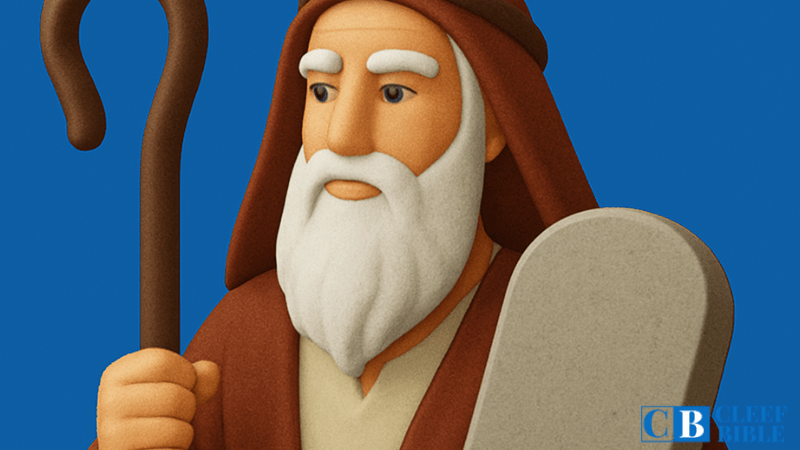
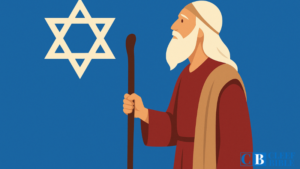
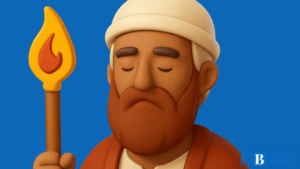
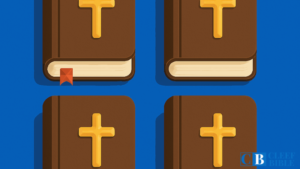




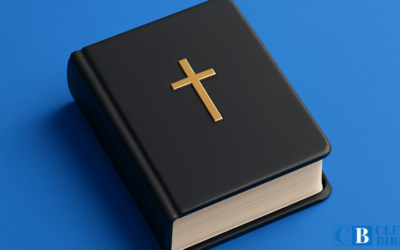




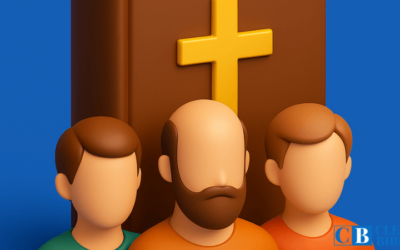
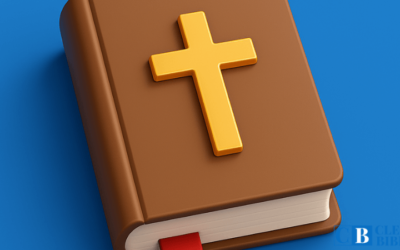


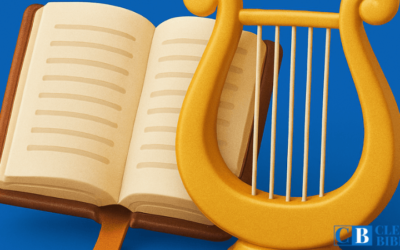

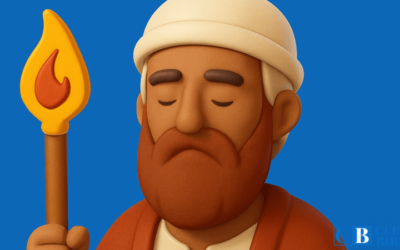


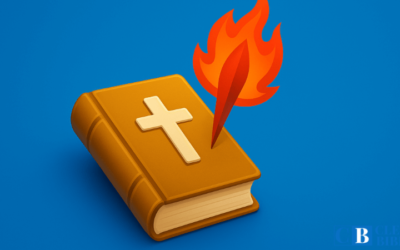
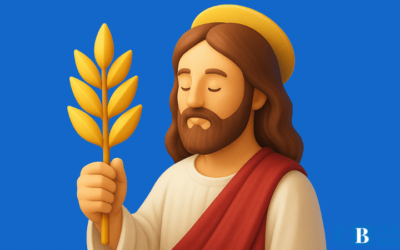

0 Comments